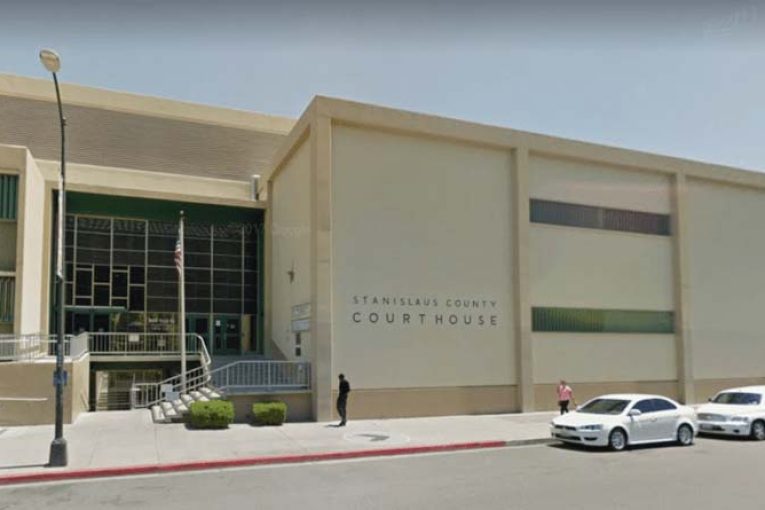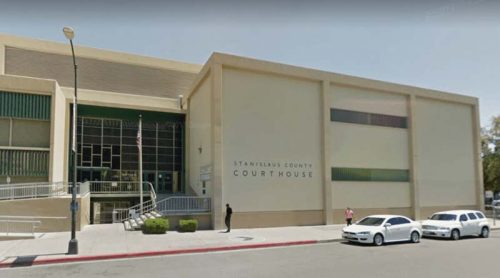

By Cynthia Hoang-Duong
MODESTO, CA – In a co-accused arson case in Stanislaus County Superior Court last week, Judge Carrie Stephens and defense attorney Martin Baker engaged in a contentious argument over the factual findings and evidence presented at the 995 motion to dismiss hearing.
The accused and his brother (his co-accused) are charged with several counts related to arson; Particularly, their third count is a violation of Penal Code 451(d) for burning an automobile. The accused is also facing a related charge for aiding his brother in the arson.
On behalf of the accused, defense attorney Baker filed a motion to dismiss the third and fourth counts because the accused believed the car was owned by his brother and there was insufficient evidence he knew a felony was committed earlier on the evening of the incident.
Similarly, his brother’s defense also filed a 995 motion, asserting that the car lease was registered to him and therefore, PC 451(d) does not prohibit him from burning his own property.
On an earlier court date, the judge had granted the prosecution’s request to reopen the preliminary hearing to resolve the issue surrounding the ownership of the vehicle.
Baker began the hearing by acknowledging that the burned car belonged to a financing company, not the accused’s brother.
However, despite the issue of ownership, the defense attorney argued, “It would have been entirely reasonable for anyone in my client’s position to reasonably believe that that car was owned by [his brother]. And to reasonably believe that [his brother] gave consent to burn the car.”
Applying the doctrine of consent and mistake of the facts, Baker suggested the accused could not consent to the crime because he mistakenly believed that his brother was the owner of the vehicle and thus, damaged his own property.
Judge Stephens interrupted, asking, “What evidence do I have that your client reasonably believed that the automobile belonged to his brother?”
Baker responded with a list of explanations: the accused’s brother was driving the vehicle and it was referred to and under the dominion of his brother. Further, he claimed it was reasonable for an individual to presume an automobile’s ownership if they were picked up in a familiar car.
Had the car been repossessed because his brother was behind on payments, the attorney also contended that “Someone in [the accused’s] position would have no reason to know that there might be some imminent repossession because it no longer has the status that he’s always believed it to have, which was his brother’s car.”
However, the judge raised concerns about speculating about the evidence, arguing the accused could have also presumed that his brother had been loaned the vehicle, noting, “Wouldn’t it be just as reasonable for him to believe that his brother took out a loan on the car and made payments on the car?”
Baker clarified that if a person borrows money to purchase a property, they have the right to destroy it even if they are obligated to a lien holder or lender. And further, no reasonable person should be expected to inquire about the status of another’s loan.
Judge Stephens insisted when individuals purchase cars, the financing company has the “pink slip” or the certificate of the vehicle’s ownership because they have a vested interest in the property.
She further stressed the customary practice of loaning a car, noting “But most people [who] buy cars have a loan. When they have a car loan, they don’t have the title to the car, somebody else does.”
And therefore, if the defense intended to speculate about the accused’s knowledge, she reasoned that she should consider the typical process of owning a car which includes loan payments.
Baker remarked that “In America, no one really owns anything. We buy everything on credit. We have it. It’s ours. We call it ours. We get a car, we customize it or pull the bumper off and put a different one on. We don’t have to check with the bank every time we do that. We’re essentially vandalizing what we believe to be our property.”
Although he acknowledged that the vehicle did not technically belong to the accused’s brother, he still had “dominion” over it.
Highlighting his client’s perspective, Baker stated if his brother asked him to damage the car, he would reasonably believe that he was permitted because he had the presumed right to destroy his own property.
The brother’s defense attorney, Del Bahner, spoke up, comparing vehicle ownership to home loans. Customarily, under a mortgage, a person owns the home while the bank has a lien on it. If a person finances an automobile, the same case applies: they can own it while the finance company has a secondary interest.
The tense debate continued as Judge Stephens complained she was being asked to speculate because there is no evidence to support the defense argument that the accused believed his brother had complete authority over the vehicle or had the legal right to burn his car.
Baker reminded the court the burden is on the prosecution to demonstrate probable cause that it is not reasonable that the accused was ignorant of the fact that his brother did not own the automobile.
Judge Stephens rejected the standard, stating that the prosecution was required to prove the probable cause of the elements of the offense. Baker responded that the vehicle’s ownership status is one of the elements.
Ultimately, the judge denied the motions to dismiss, citing the new evidence that proves the company had a legal interest in the car. And the judge added the act of burning a car is “highly suspicious” because the accused was involved in purchasing the gasoline and lighting the vehicle.
Regarding the fourth count, the judge stated there was ample evidence that the accused knew a felony had been committed earlier.
The judge concluded the hearing by summarizing, “People don’t burn their cars for fun. The other actors were his cousin and brother. It is inconceivable that no conversation between these three occurred about the reasons for the burning of a car.”
The court insisted it had no evidence that the accused mistakenly presumed his brother was legally entitled to destroy the vehicle because he fully owned it.
Another case management conference is scheduled for June 26.